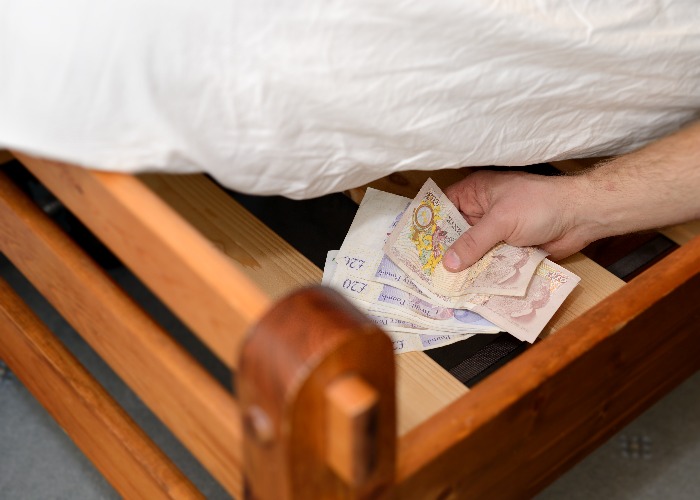Does having your own savings make you a ‘financial cheat’?

Research suggests many of us are ‘financially cheating’ on our partners by keeping separate savings. Sue Hayward argues that such infidelity is to be commended.
Money matters can be one of the biggest causes of rows in relationships.
So is having separate savings the answer or does this make you a financial cheat? Because if so, I’m one!
There’s no ‘one size fits all’ way of doing your finances.
If you’re in a relationship, even if you’ve got a joint account; these days you may well have agreed to have separate ones too.
But if having separate bank accounts is ok, what happens when it comes to solo savings?
Having a separate savings pot could mean you’re a ‘financial cheat’, according to price comparison site Gocompare.
Apparently, one in eight of us admits that our partners have no idea how much we have stashed away in our savings pot.
Is that really such a bad thing?
The case for separate savings
How you organise your finances is a very personal thing.
And while I’m not about to reveal what’s in my bank account; I’m happy to share the fact that while my husband and I have a joint account.
I’ve also got a solo one and, along with our shared savings, we also both have our own savings too.
And it seems I’m not alone in this.
Over half of us who are in a relationship say they only have ‘separate savings’, according to Scottish Widows’ research.
And 45% of those in a relationship say they both only have separate bank accounts.
My argument is that having your own savings spells financial freedom (by which I don’t mean a ‘running away’ fund!) and that keeping some of your funds separate makes for a happy and financially healthy relationship.
So in my case, it means if one of you is into gadgets and gizmos, and wants the latest mobile or tech gadget, while the other one thinks their four-year-old phone works perfectly well, (yes that’s me!), then separate savings can make for a stress-free financial life.
Find the right current account for your needs
Can secret savings go bad?
If one of you is secretly syphoning money from the shared joint account to a secret savings stash then that’s another matter.
But if you’ve agreed on separate bank accounts, then surely separate savings accounts are merely an extension of that?
After all, keeping spare cash lying around in the bottom of your current account isn’t always the best thing to do.
Chances are you’ll be more tempted to spend it, so can make financial sense to switch any spare cash to a savings account at the end of the month.
And especially when you can earn 5% on some regular savings accounts, if you have a current account in the same place.
No need to feel guilty
With separate savings, you get to decide what to put in and take out.
Nobody’s judging you and there are no arguments over what you spend it on.
Sticking with the ‘traditional’ approach of having both a joint current and savings account can be a “recipe for endless rows about every penny, according to Sarah Coles, personal finance analyst at Hargreaves Lansdown.
She says keeping some savings to yourself can actually be a sensible approach.
“It allows savers and spenders to manage some of their cash however they see fit, so no need to feel guilty for having secret stashes of cash.”
Make sure you earn a top rate on your savings
Should you expect to know your partner’s bank balance?
Now, I’m all for financial trust and honesty, and if you’ve agreed to have separate accounts, (for whatever reason), should you then really expect to know your partner’s bank or savings balance?
And more to the point, and be honest with me on this one, how many of us would actually know how much we’ve got in our own current or savings accounts right now, say down to the nearest fiver if we were pushed to come up with a figure?
Can coming clean cause more arguments?
Cynics might say, if you’ve agreed to keep separate savings, what’s the big deal about coming clean over how much you’ve both got?
So if this is the case, how do you do it? Do you agree to give each other a regular monthly update over breakfast where you make a note to tell your partner that you’ve stuck another £100 in your savings this month and they tell you they’ve spent some of theirs on a trip for your Birthday?
And in the interests of spilling the ‘financial beans’, if you discover your partner’s stashed away £5,000, while your spending habits mean you’ve only managed £500, is this going to trigger an argument if you develop a case of ‘money envy?’
And isn’t this possibly the very money argument that you agreed to have separate savings to avoid?
What do you think? Is separate savings a good idea, or should couples share everything, including finances? Have your say in the comments section below.
Comments
Be the first to comment
Do you want to comment on this article? You need to be signed in for this feature